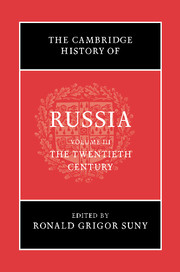Book contents
- Frontmatter
- Introduction
- 1 Reading Russia and the Soviet Union in the twentieth century: how the ‘West’ wrote its history of the USSR
- Part I Russia and the Soviet Union: The Story through Time
- 2 Russia’s fin de siècle, 1900–1914
- 3 The First World War, 1914–1918
- 4 The revolutions of 1917–1918
- 5 The Russian civil war, 1917–1922
- 6 Building a new state and society: NEP, 1921–1928
- 7 Stalinism, 1928–1940
- 8 Patriotic War, 1941–1945
- 9 Stalin and his circle
- 10 The Khrushchev period, 1953–1964
- 11 The Brezhnev era
- 12 The Gorbachev era
- 13 The Russian Federation
- Part II Russia and the Soviet Union: Themes and Trends
- Bibliography
- Index
- References
5 - The Russian civil war, 1917–1922
from Part I - Russia and the Soviet Union: The Story through Time
Published online by Cambridge University Press: 28 March 2008
- Frontmatter
- Introduction
- 1 Reading Russia and the Soviet Union in the twentieth century: how the ‘West’ wrote its history of the USSR
- Part I Russia and the Soviet Union: The Story through Time
- 2 Russia’s fin de siècle, 1900–1914
- 3 The First World War, 1914–1918
- 4 The revolutions of 1917–1918
- 5 The Russian civil war, 1917–1922
- 6 Building a new state and society: NEP, 1921–1928
- 7 Stalinism, 1928–1940
- 8 Patriotic War, 1941–1945
- 9 Stalin and his circle
- 10 The Khrushchev period, 1953–1964
- 11 The Brezhnev era
- 12 The Gorbachev era
- 13 The Russian Federation
- Part II Russia and the Soviet Union: Themes and Trends
- Bibliography
- Index
- References
Summary
While the story of the Russian Revolution has often been retold, the historiography of the event’s most decisive chapter, the civil war, remains remarkably underdeveloped. A generation ago, the nature of available sources as well as dominant paradigms in the historical profession led Western historians of the civil war to focus on military operations, Allied intervention and politics at the top. This scholarship pinned the blame for the resulting Communist dictatorship on Marxist-Leninist ideology and/or Russia’s backwardness and authoritarian political culture. In the 1980s, interest in social history and Bolshevik cultural experimentation stimulated publication of new academic and popular overviews of the civil war, and also of a landmark collaborative volume that shifted the explanation for the Communist dictatorship from conscious political will and ideology to the circumstances of the ordeal. The first full scale investigations of the civil war in Petrograd and Moscow appeared as well. Some studies issued at this time cast the period as a ‘formative’ one, emphasising that the Bolshevik behaviour, language, policies and appearance that emerged during 1917–21 served as models for policies later implemented under Joseph Stalin.
Although Soviet historians writing on 1917 often produced results that were not entirely invalidated by ideological content, this is less the case in regard to the civil war, whose history they patently falsified, undoubtedly owing to mass discontent with Bolshevik practices after 1918. Focusing on the political and military aspects of the civil war, Soviet historians published a ‘canonical’ five-volume survey of the subject between 1935 and 1960.
Keywords
- Type
- Chapter
- Information
- The Cambridge History of Russia , pp. 140 - 167Publisher: Cambridge University PressPrint publication year: 2006
References
- 2
- Cited by

